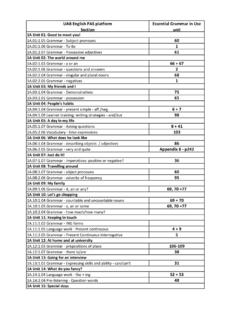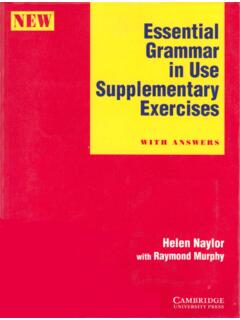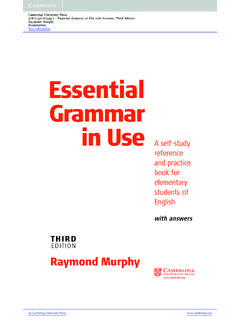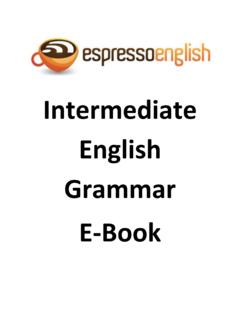Transcription of ENGLISH GRAMMAR IN USE - sirnak
1 ENGLISH GRAMMAR IN USEO kutman Mustafa Balta An interactive GRAMMAR With many examples and answersIt s a perfect book to prepare the exam of YDS The book contains about examplesThe GRAMMAR is often very direct and easy to understand. At other times we give more details, because they are necessary for clear understanding and accurate usageENGLISH GRAMMAR IN USEO kutman Mustafa Balta An interactive GRAMMAR With many examples and answersIt s a perfect book to prepare the exam of YDS The book contains about examplesC N US YAYINLARI A DA T RK YAZARLARI | ----------------Bab ali Caddesi, No. 14 Ca alo lu - stanbulTel: (0212) 5283314 (0212) 5277982http: / / n Ad K TABIN na haz rlayan: ---------------Kapak tasar m : ---------------Dizgi: --------------B R NC BASKI: Kas m, 2010 ISBN 978-605-127--------------Bask ve cilt:Kitap Matbaac l kSanayi ve Ticaret Ltd.
2 A Cad. No. 123 Kat 1 Topkap , Zeytinburnu stanbulTel: (212) 482 99 10 Sertifika No: 16053 YAZARIN ADI, 2010 C N US YAYINLARI, 2010T m haklar sakl d yay n n hi bir b l m yazar n yaz l n izni olmaks z n,herhangi bir ekilde yeniden retilemez,bas l ya da dijital yollarla o alt sa al nt larda mutlaka kaynak in T rkiyeHow to use the grammarThis book is designed so that you can find the answers to particular problems of ENGLISH GRAMMAR . You are not expected to start at Unit 1 and study the Units one by one, or to study a whole Unit at a time. Different people have different problems, so they need to look at different points in different the GRAMMAR unitsEach unit has got two parts. The left- hand page contains the explanation of the GRAMMAR rules and patterns. Explanations given clearly and concisely for each area of GRAMMAR .
3 There are many exercises about the each Topic. These examples have an important meaning place to understand the lesson answersFor each exercise, the first or second has been supplied. You can use this as a model for the rest of the to exercisesThe Key to all the exercises is given at the back of the book .There are about 3000 exercises about all reference for self-study or use in class. It s a perfect book to prepare general ENGLISH GRAMMAR and The University Examination of Mustafa BALTA irnak University Foreign Language DepartmentENGL SH GRAMMAR N USE | 7 CONTENTSP resent and pastUNIT 1 Present continuous (I am doing).UNIT 2 Present simple (I do)UNIT 3 Present continuous and present simple (I am doing and I do)UNIT 4 Past simple and (to be) pastUNIT 5 Past continuous (I was doing)Present perfect and pastUNIT 6 Present perfectUNIT 7 Present perfect with Ever - neverUNIT 8 Present perfect continuousUNIT 9 Present perfect continuous and simple (I have been doing and I have done)UNIT 10 How 11 Since and forUNIT 12 Present perfect and past tense (1) (I have done and I did)UNIT 13 Past perfect (I had done)UNIT 14 Past perfect continuous (I had been doing)UNIT 15 Have and has gotUNIT 16 Used toThe Future tense - Conjunctions of timeUNIT 17 Future Actions in the Present I am doing / do / going to do.
4 18 Going to futureUNIT 19 The Future tenseUNIT 20 The Future perfect tense and will beUNIT 21 Future ContinuousUNIT 22 Conjunctions of time- When / Conditional clauseUNIT 23 Can, could and (be) able toUNIT 24 Modal verbsUNIT 25 May and might8 | Mustafa BaltaENGL SH GRAMMAR N USE | 9 UNIT 26 Must and have toUNIT 27 Need / Needn tUNIT 28 ShouldUNIT 29 Had betterUNIT 30 Requests, offers, permission and invitationsUNIT 31 Conditional clause (type-one)UNIT 32 Conditional clause (type-two)UNIT 33 Conditional clause (type-three)UNIT 34 I wish, If onlyPassive Voice - Causative VerbsUNIT 35 Passive Voice affirmativeUNIT 36 Passive Voice negative-questionUNIT 37 Passive Voice , begins with the personUNIT 38 It is said that (be) supposed 39 Causative VerbsReported speechUNIT 40 Reported speech - imperativeUNIT 41 Reported speech - tell-toldUNIT 42 Reported speech -QuestionsTag questions ,Pronouns -object subject-possessiveUNIT 43 Tag questions -do you?
5 Isn t it? 44 Subject and Object pronouns- I / me / he / him 45 Possessive Adjectives my / his / their 46 Possessive pronouns and whose-mine / yours / hers conjunctions -Purpose ClausesUNIT 47 The conjunctionsUNIT 48 Questions- Have you? Do 49 WH QuestionsUNIT 50 Purpose ClausesUNIT 51 The imperative in EnglishUNIT 52 Short AnswersCountable and uncountable -Articles S 53 Countable and uncountable nouns (1)UNIT 54 The definite article-theUNIT 55 The indefinite article :a, anUNIT 56 Do and makeUNIT 57 Singular and PluralUNIT 58 Apostrophe s, genitive sPronouns and determiners- Relative clausesUNIT 59 Reflexive pronouns (myself / yourself / themselves) 60 Some and anyUNIT 61 Indefinite Pronouns No / thing / one / body / where UNIT 62 Quantifiers .. Much, many, a lot, plentyUNIT 63 All of most / most of no / none of 64 Too / either / so I am / neither do / both of neither / neither of / either / either ofUNIT 65 Relative clauses -1 ( Who / which / that)UNIT 66 Relative clauses -2 ( When / Where / Why)UNIT 67 Relative clauses -3 (whose / whom)Adjectives adverbs and ComparisonUNIT 68 Adjectives and adverbs (quick / quickly)UNIT 69 So and suchUNIT 70 Comparison (comparative) cheaper, more expensive 71 Comparison ( EQUALITY ) --as.
6 AsUNIT 72 Comparison (Superlative) --the longest the most enjoyable 73 Always, still--Any more / any longer / no longerConjunctionsUNIT 74 Although / though / even though in spite of despiteUNIT 75 In case UNIT 76 As long as- provided / providingUNIT 77 During and while10 | Mustafa BaltaENGL SH GRAMMAR N USE | 11 UNIT 1 Present continuous (I am doing) Present Continuous Tense AffirmativeNegativeInterrogativeLong FormContracted FormI am playingI am not playingI m not playingAm I playing?You are playingYou are not playingYou re not playingAre you playing?He / she / it playsHe / she / it is not playingHe / she / it s not playingIs he / she / it playing?We are playingWe are not playingWe aren t playingAre we playing?You are playingYou are not playingYou re not playingAre you playing?
7 They are playingThey are not playingThey aren t playing Are they playing?We use the Present Continuous with Normal Verbs to express the idea that something is happening now, at this very moment. It can also be used to show that something is not happening is driving now, at the time of speaking. (This means, The action is not finished)Robert is not studying at the moment. (Robert isn t studying at the moment.)The baby is not sleeping now (The baby isn t sleeping now)They are not listening to music. (They aren t listening to music)She is not writing a letter at the moment. (She isn t writing a letter at the moment.)My mother is not making a cake today. (My mother isn t making a cake today)We are not working today. It s holiday. (We aren t working today. It s holiday.) Are you working hard today? Yes! I ve got a lot to do. We make the present continuous tense by adding -ing to the base verb.
8 Normally it s simple - we just add ing .Prepositions- List of irregular verbsUNIT 78 Telling time- Giving the DateUNIT 79 Until by / the 80 Before / afterUNIT 81 Prepositions of place -In, at, onUNIT 82 Most important prepositionsUNIT 83 Cardinal, Ordinal NumberUNIT 84 A little, a fewUNIT 85 86 List of irregular verbsUNIT 87 Key to exerciseThey are having breakfastShe is planning to visit some historical places | Mustafa BaltaENGL SH GRAMMAR N USE | 13 Just add -ing to the base verb:work>workingplay>playingassist>assi stingIf the base verb ends in consonant + stressed vowel + consonant, double the last letter:(vowels = a, e, i, o, u)stop>stoppingrun>runningbegin>beginnin gIf the base verb ends in ie, change the ie toy:lie>lyingdie>dyingIf the base verb ends in vowel + consonant + e, omit the e:come>comingmistake>mistakingI am playing base-ball.
9 She is looking for her are going to the station. They are speaking with the is saying he doesn t need a coach. I am thinking about are looking at the clown. I am watching T are playing with your computer. We are trying to stop are some verbs which are never or hardly ever used in progressive , love, doubt, hate, suppose, prefer, imagine, realise, understand, know, want, remember, wish, like, need like his attitude. (NOT I am liking ..)I rang her up because I needed to talk. (NOT .. because I was needing to talk.)I have only known her for two days. (NOT I have only been knowing her ..)I m tired. I want to go home (not I m wanting) I don t understand. What do you mean?Do you know that girl? Yes, but I don t remember her name I always do and I m always doingI always go to work by car.
10 (not I m always going ) Who are you writing to?To talk about planned future arrangements: Next month I am spending my holidays in am meeting some friends after work. I am not going to the party he visiting his parents next weekend? Isn t he coming with us tonight?Next week I m going to the theatre. When are you getting married?He is seeing his mother on Tuesday She is travelling to York at the weekend. What are you doing after this lesson? After school? tonight? tomorrow? Wednesday night?You can use the present continuous with today / this week / this year etc. (periods around now);You re working hard today. (not you work hard today ) Yes, I have a lot to company I work for isn t doing so well this m reading a really good book at the moment. It s about a man 1- John is not reading the book at the time of speaking. 2- He means that he has started it, but has not finished it yet.










